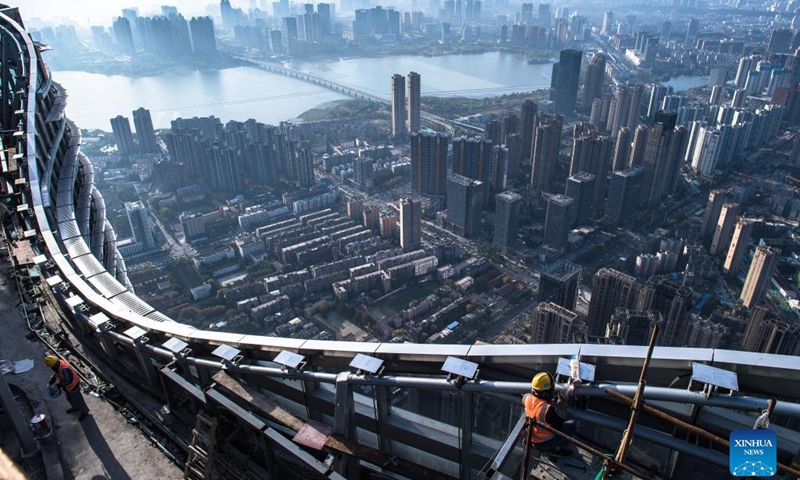
Photo taken on Nov. 15, 2021 shows the construction site of Greenland Center in Wuhan, central China's Hubei Province. Construction on Wuhan Greenland Center, a skyscraper project, has come to the final stage. Photo: Xinhua
Hong Kong Special Administrative Region (HKSAR) Chief Executive Carrie Lam kicked off her tour of Central China's Hubei Province visiting a host of Wuhan-based companies and attending the Hong Kong-Hubei Co-operation Conference on Monday, another move that signaled Hong Kong's eagerness to integrate deeper with the mainland's economy, which experts said would benefit Hong Kong.
Lam attended the First Plenary of the Hong Kong-Hubei Co-operation Conference on Monday, according to a report released by the Government of HKSAR on Monday. This is Lam's first visit to Hubei in her capacity as HKSAR's chief executive.
During the conference, Lam said that Hong Kong will offer professional consultancy services to Hubei Airport Group on airport construction, operation and management, as well as development of associated services. Moreover, the city will support airlines in Hong Kong and Hubei to increase frequency of two-way flights.
According to the report, the two localities will foster collaboration between the Hong Kong Exchanges and Clearing Limited (HKEX) and Hubei provincial government, in order to encourage Hubei-based enterprises to list in Hong Kong and use HKEX's platform for re-financing.
The SAR encourages more Hubei entities to make use of Hong Kong's capital markets and professional services to boost green and sustainable development, financing and certification, as well as promoting the development of a carbon emissions trading system to reduce emissions, in order to the country's carbon neutrality target.
Moreover, the both sides will explore the establishment of a joint training mechanism for technology talent, and select a cohort of talent from the two localities each year to exchange and study in higher education and scientific research institutions.
Lam's first stop in Hubei was the Wuhan Asia General Hospital, which was partially invested with investment from Hong Kong. During the visit, Lam looked around the hospital facilities, including the coronavirus vaccine center, and talked with the hospital's staff workers. Lam said she hoped Hong Kong and Wuhan will have bigger space for cooperation in medical treatment and health research, news portal ifeng.com reported.
Lam also visited China's National Intelligent Connected Vehicle (Wuhan) Test and Demonstration Zone, located in the Wuhan Economic and Technological Development Zone, to make an on-the-spot investigation into the local self-driving sector and intelligent connected applications.
The visit, which came on the heels of meetings between HKSAR officials and those of mainland cities including Shenzhen, Shanghai and Southwest China's Sichuan Province, was seen by economists as signs of Hong Kong showing an eagerness to integrate deeply with the mainland's economy and seek opportunities, which would help the city's COVID-battered economy to stabilize.
"Hong Kong has previously focused on cooperation in the Guangdong-Hong Kong-Macao Greater Bay Area, but Lam's Sichuan trip in 2018 and her Wuhan trip this year show that Hong Kong is actively integrating into the country's overall economic development and continuously strengthening economic and trade ties with the mainland," Dong Dengxin, director of the Finance and Securities Institute at the Wuhan University of Science and Technology, told the Global Times on Monday.
Dong said that Wuhan has all kinds of talent, with nearly 100 colleges and universities, while Hong Kong is very developed in finance, tourism and trade. The two regions can strengthen their cooperation in the fields of finance, trade and other areas, said Dong.
One complementarity mentioned by economists is that Wuhan and other Hubei cities could attract more capital from Hong Kong, given the latter's role as a world financial hub.
"For example, Hong Kong could secure talent, land and financing resources for major cooperative projects between Hong Kong and Hubei, helping Hubei establish emerging industry chains, while Hubei could set up a special approval channel for such projects," Thomas Yeung, Hong Kong economist and vice dean of the Futian School of Finance, told the Global Times on Monday.
He particularly mentioned that many Hong Kong investors are looking for new-energy vehicle (NEV) investment opportunities, an industry where Hubei has some advantages.
Furthermore, Hong Kong capital could enter Hubei to open more hospitals and other health care facilities, while importing more medical appliances and coronavirus-fighting products from Hubei, Yeung said.
Analysts said that Hong Kong's closer interaction with mainland cities will be helpful for Hong Kong to develop economy, as the mainland can provide a large market, ample commercial scenarios and talent for Hong Kong.
"Given the China-US political uncertainties, the chances of risks in Hong Kong-overseas cooperation are much higher than in Hong Kong-mainland partnerships," Yeung said.
But he stressed that Hong Kong's collaboration with mainland cities should be "project-oriented," suggesting that project collaborative mechanisms should be set up via representative offices in Hong Kong or the mainland to create a "top-down push, down-top implementation" cooperative model.
In September, Lam and other Hong Kong officials visited Sichuan Province and signed an agreement for closer cooperation across 12 sectors. In the same month, she led a delegation to Shenzhen to attend the Hong Kong-Shenzhen cooperation meeting.




